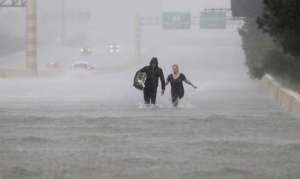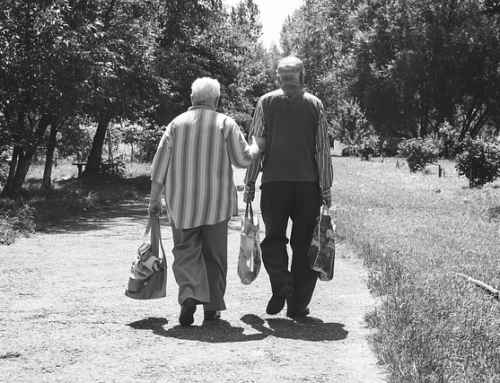By Eddie Pipkin
September 1, 2017
As the tragedy of Hurricane Harvey unfolded last week, it was inspiring, as always, to watch the ways in which local congregations responded to the needs of the community. Churches served as shelters, distribution points for aid, logistical centers for rescue efforts, and places where people could gather together to pray and comfort one another. Some well-known churches struggled in very public ways to define their role in the storm. Some quickly responded with eager and open hearts, only to then find themselves in need of the very aid they had been generously offering others. Many went quietly and humbly about the business of supporting their local neighborhoods as best they could, just like they do, not only dramatic days, but on quiet days when people are dealing with the quotidian dramas and traumas which routinely define the lives of every community. (Even as a local pastor, far removed from Texas, was speaking with me about plans for her congregation to respond to Harvey in a meaningful way,  she was also mentioning the stops she would be making on the way home to a congregation member in hospice and another grieving family who had just lost a child.)
she was also mentioning the stops she would be making on the way home to a congregation member in hospice and another grieving family who had just lost a child.)
All congregations should have strategies in place to respond in times of disaster. This includes the inevitable natural disasters that make international news: we should have established strategies for how to help our ministry participants respond effectively when the news tugs at their compassionate and generous instincts. We should also have robust response plans in place for responding to local disasters (emergency response plans for maintaining ministry in the face of steep challenges, emergency volunteer response teams to aid the community directly, and a clear communications strategy for letting our ministry partners know how they can help in the midst of the chaos).
Additionally, disasters and tragedies tend to produce periods of deep reflection, and as spiritual leaders we should respond to the opportunity to get people thinking about larger issues of compassion, service, and the nature of community. This is a natural process. Writing for The New Yorker, journalist Jia Tolenito shared this paragraph, exploring the psyche of Houstonians:
And yet this week I suspect we’ll mostly see another side of Houston: its scrappy sense of humor, and its extraordinary and very Texan largesse. Houston responds to disaster with fortitude: the city absorbed two hundred thousand Vietnamese refugees in the nineteen-seventies, and it currently resettles twenty-five of every thousand refugees that the United Nations resettles anywhere—that’s more than any other city in America, and more than most countries. After Hurricane Katrina, Houston took in a quarter of a million evacuees, and, aided by Mayor Bill White’s multimillion-dollar resettlement program, as many as forty thousand people stayed. Over the weekend, Houston teen-agers were out in the streets rescuing people via kayak. As Rebecca Solnit argues in her 2009 book, A Paradise Built in Hell, disasters create a window into social desire and potential. We’re normally encouraged to think of private life as precious and public life as a nuisance, she writes, but “disasters, in returning their sufferers to public and collective life, undo some of this privatization, which is a slower, subtler disaster all its own.” Disasters remind us that ambitious, difficult things are not just possible but necessary; in Houston, Harvey is already showing how an individualistic work ethic and a spirit of collective generosity can and have to coexist.
That passage was not written from a ministry perspective, yet it unpacks much that ministry leaders can use as an opening to discussion and action. The images of individuals stranded on rooftops are powerful. They reflect a basic human fear of isolation. From where will help come? As such, they are a powerful metaphor for the local church. Even in times of apparent calm – even when things seem to be rolling along trouble-free – there are always people in our midst who feel that they are isolated and alone as the flood waters rise around them with no help in sight.
We can be active agents of God’s grace and mercy, helping to save people from drowning, whatever the forces that are pulling them under. In thinking about how we help our ministries and institutions fulfill these roles, Hurricane Harvey and Houston offer some lessons:
- The Power of the Cajun Navy: It was amazing to see the way that regular folks with jon boats and kayaks paddled through the flooded streets of Houston to ferry people to safety. Cadres of boaters from Louisiana, who had themselves experienced massive floods just a year ago, showed up to help. And the overwhelmed authorities officially called for the involvement of these citizen rescuers. It is an excellent reminder to us in ministry that the bulk of the important work we do in the community is not supposed to be done by professionals, but by committed, enthusiastic lay people. We should empower lay people to do as much they can, giving them the tools they need and a clear sign from us that their work is valued and essential.
- The Kindness of Strangers Is Amazing, but Friends and Family Are Hard to Beat: So many complete strangers reached out to so many people who needed help in Houston, but the fact is that most people DID NOT need dramatic rescues. That’s because they had networks of friends, family, church communities, etc. that were helping them plan and working together to keep them safe. Prior relationships matter! And beyond providing excellent worship services and great Bible studies, the experience of disasters like Harvey reminds us that we need to be laser-focused on helping disciples build relationships within and beyond their church walls.
- Preparation Matters: At all levels, preparation makes a difference at crunch time (whether responding to a natural disaster of epic proportion or an inevitable occurrence such as the death of a community member). No preparation is ever wasted – what we learn and how we organize as we prepare is always useful – so there should consistently be some element of our leadership gatherings that is focused on preparation. Examples were mentioned above in term of ministry disaster response, and while I have seen that pay off in my local congregation, I have many times more often seen the tender and empathetic “grief packet,” lovingly prepared by a church office administrator, help grieving people handle the complex logistics of a family loss.
- This Is a Long-term Process: The rain in Houston has subsided, and the news media will move on to its next big story, but the pain and struggle for the people of Texas will continue for months and years to come. As ministry leaders, we are called to partner with people for the long-term. We should help our ministry partners approach relationships from a biblical perspective, resisting shotgun approaches and quick fixes, and committing instead to deep relationships and thoughtful processes. We walk with others on the long journeys of life, and in so doing, the grace of God is revealed in surprising ways that build resilient communities.
What has been your experience in dealing with disasters large and small through your ministries? In what ways has grace been revealed and communities strengthened? What have you gotten wrong and used the experience to change your approach? Share your own stories in our comments section.
Many of the materials we have developed through Excellence in Ministry Coaching are focused on this idea of building deeper, more authentic communities. Our Membership to Discipleship book explores the ways true discipleship leads to exactly these kinds of committed relationships. Our Connect! series offers ideas for building these relationships within and beyond existing church communities, and our latest book, Discipler, is a practical primer for small groups to develop intimate spiritual friendships.







Leave A Comment